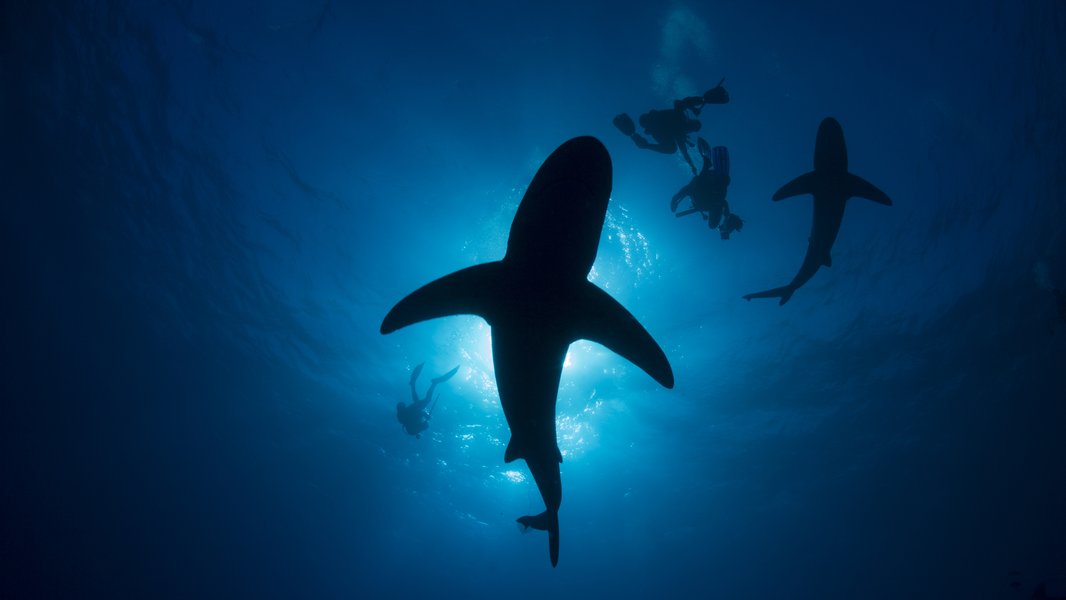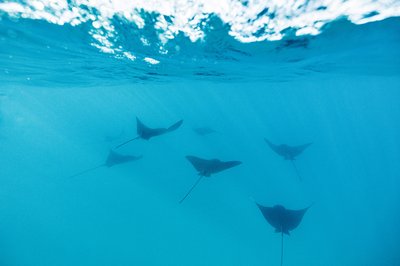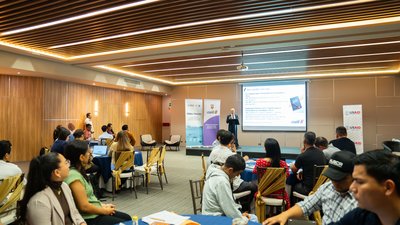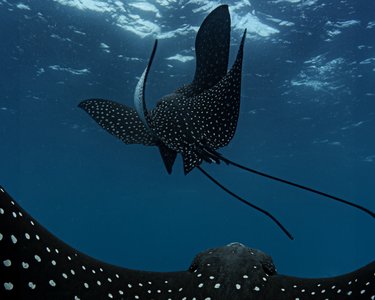Healthy Populations of Sharks and Rays, Thriving Communities:
The Habla Tiburon Approach
The Habla Tiburon Approach
What is Habla Tiburón?
Habla Tiburón is a project that seeks to improve the long-term health of shark and ray populations in Ecuadorian waters, as well as the Eastern Tropical Pacific, while empowering fishing communities. Habla Tiburón focuses on three main lines of work: 1) implement market strategies that promote seafood products with a low impact on shark and ray populations 2) help strengthen governance of Ecuadorian fisheries and 3) increase compliance with national regulations. These efforts will help conserve shark and ray populations while improving the livelihoods of coastal communities.
The challenge
Ecuadorian regulations prohibit targeted shark fishing, as well as bringing some threatened species ashore. However, many shark species caught while targeting other species (bycatch) can still be kept and legally traded for their meat and fins. Stricter regulations are only in place for threatened species. In Ecuador, there are no limits on bycatch for most shark species, which can lead to overfishing and threaten their populations.
While this legal loophole needs to be addressed, it's important to recognize that sharks are also a valuable resource for local communities and the fishing industry in Ecuador. Therefore, conservation strategies should take a socio-ecological approach. This means implementing management actions that protect the livelihoods of fishing communities, strengthen markets for sustainable products, and provide viable economic incentives for the industry.

Strategy 1: Developing market-based incentives
Market demands strongly influence fisheries, so Habla Tiburon’s strategy is to create market-based incentives that make it appealing to reduce trade in shark and ray products. By developing sustainable markets that rely less on sharks and rays, fishers are provided with more reliable and long-term sources of income. This approach ensures that these resources will be available for future generations.
Internationally, the trade of shark products that cannot be proven sustainable is problematic. Ecuador is already facing trade restrictions because of this issue, affecting its access to international markets. Strengthening sustainable practices is essential to avoid such restrictions, promote the long-term viability of this industry and ensure the livelihoods of fishing communities.
To achieve this, Habla Tiburón will:
- Implement new trading systems with better facilities to improve the quality and value of sustainable seafood products that have a low impact on shark and ray populations;
- Strengthen the abilities of fishing communities and associations to develop sustainable seafood products and market strategies;
- Encourage the private sector - including restaurants, retailers, and hotels - to responsibly source seafood products; and
- Facilitate agreements with the fishing industry sectors that ensure socially responsible standards and fishing practices.
Strategy 2: Improving fisheries governance
Improving fisheries governance is crucial for the long-term health and sustainability of shark and ray populations. Habla Tiburón aims to strengthen this framework by promoting an inclusive approach, involving the private sector, fishing cooperatives, and other key actors in decision-making and co-management processes.
By promoting a co-management approach that includes the public and private sectors, along with fishing cooperatives, we aim to ensure that coastal fishing communities actively participate. This approach also highlights the essential role of women in these fisheries and strives to bring attention to historically marginalized groups within the fishing industry, enhancing their visibility and inclusion.
Our key activities include:
- Assist in the implementation of Task Forces that promote the participation of public and private actors in decision-making processes, with the aim of minimizing the impact of fishing on shark and ray populations.
- Bridging critical scientific knowledge gaps to enable robust, science-based management of fisheries that report high catches of sharks and rays.
- Assist the government in implementing and enforcing evidence-based policies and legislation necessary for the management and conservation of shark and ray populations in Ecuador.
Strategy 3: Strengthening monitoring and compliance
Finally, Habla Tiburón aims to enhance the monitoring and compliance abilities of national authorities and fisher’s associations to reduce Illegal, Unreported, and Unregulated (IUU) fishing of sharks and rays in Ecuador. These efforts are essential for effective management and conservation.
Habla Tiburón will focus on:
- Strengthening the capacity of national authorities to control the shark product trade, ensuring transparency and traceability.
- Enhancing the role of national fishing associations in monitoring and controlling shark and ray catches. Providing essential fisheries data to the government will improve their capacity for self-regulation and leadership.
- Promoting best fishing practices within key fleets in collaboration with fishing associations and the government. This will minimize bycatch and retention of sharks and rays, while improving the efficiency of fishing practices for target species.



In conclusion:
By adopting a comprehensive approach focused on strengthening markets, governance, and compliance, Habla Tiburón aims to work with the government and society to address the major challenges to shark and ray conservation in Ecuador. The project will also enhance stakeholder participation in fisheries management and improve the livelihoods of fishing communities. Regionally, these efforts will help Ecuador become a leader in managing fisheries that impact sharks and rays, aiding in the conservation of populations that cross-national borders and are threatened by IUU fishing across the entire Eastern Tropical Pacific region. These species are essential for marine ecosystems, as they help maintain ecological balance, their presence helps ensure the health of the ocean.






